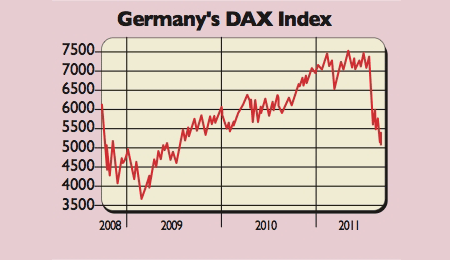Get the latest financial news, insights and expert analysis from our award-winning MoneyWeek team, to help you understand what really matters when it comes to your finances.
You are now subscribed
Your newsletter sign-up was successful
Want to add more newsletters?

Twice daily
MoneyWeek
Get the latest financial news, insights and expert analysis from our award-winning MoneyWeek team, to help you understand what really matters when it comes to your finances.

Four times a week
Look After My Bills
Sign up to our free money-saving newsletter, filled with the latest news and expert advice to help you find the best tips and deals for managing your bills. Start saving today!
Germany was the haven trade until quite recently, says Lorne Campbell of Credit Suisse but this summer sentiment shifted. Since early July, the DAX has lost around 30%; the S&P 500 barely half that figure. August's 19% slump in the DAX eclipsed even the decline seen after Lehman's collapse in October 2008.

So what's the problem? It's partly a question of the German economy slowing and the DAX being an especially cyclical, or economically sensitive, index. But the euro crisis, with many investors concerned about the strength of Germany's banks, appears to be a key issue.
The DAX is highly liquid, and so "it has been one of the indices through which investors have most easily been able to express a negative view", says Campbell. Short-selling bans in other countries have also driven nervous investors into the German market, contributing to selling pressure.
MoneyWeek
Subscribe to MoneyWeek today and get your first six magazine issues absolutely FREE

Sign up to Money Morning
Don't miss the latest investment and personal finances news, market analysis, plus money-saving tips with our free twice-daily newsletter
Don't miss the latest investment and personal finances news, market analysis, plus money-saving tips with our free twice-daily newsletter
The crisis has made the DAX historically cheap in terms of both the 2012 price/earnings (p/e) ratio and the cyclically adjusted p/e. But with Europe's debt crisis nowhere near over, the index looks likely to get even cheaper.
Get the latest financial news, insights and expert analysis from our award-winning MoneyWeek team, to help you understand what really matters when it comes to your finances.
MoneyWeek is written by a team of experienced and award-winning journalists, plus expert columnists. As well as daily digital news and features, MoneyWeek also publishes a weekly magazine, covering investing and personal finance. From share tips, pensions, gold to practical investment tips - we provide a round-up to help you make money and keep it.
-
 Should you buy an active ETF?
Should you buy an active ETF?ETFs are often mischaracterised as passive products, but they can be a convenient way to add active management to your portfolio
-
 Power up your pension before 5 April – easy ways to save before the tax year end
Power up your pension before 5 April – easy ways to save before the tax year endWith the end of the tax year looming, pension savers currently have a window to review and maximise what’s going into their retirement funds – we look at how

